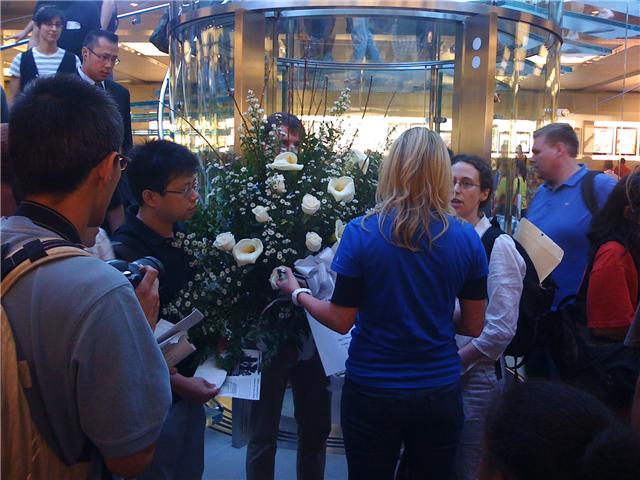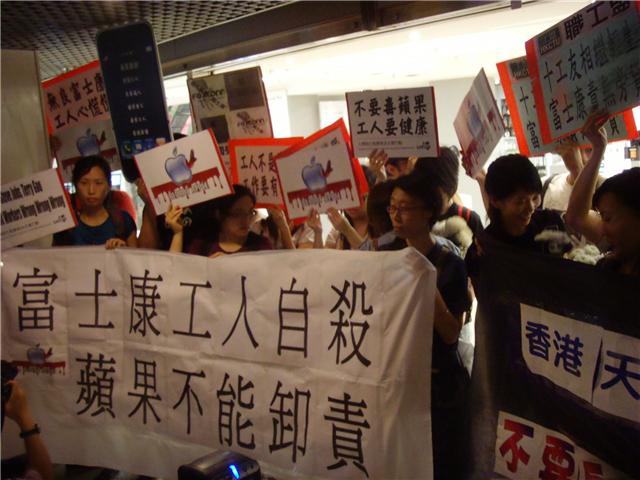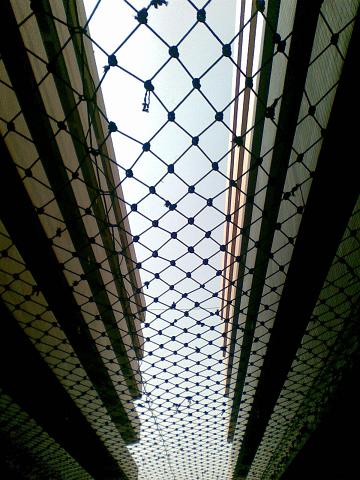Update!
 Foxconn has promised to give high raises to all its workers in China. At the Longhua plant where the deaths occurred, the raises will go up to over 100% by October 2010. Details here: http://focustaiwan.tw/ShowNews/WebNews_Detail.aspx?ID=201006080018&Type=aECO. This is a great result money-wise. I hope this change will also mean fewer hours for workers because they won't need to do as much overtime to get by. After all, man does not live by bread alone -- he also needs to sleep some. The above photos are of a protest at the Apple Store in New York on June 7 and of a similar protest at another Apple Store in Hong Kong on June 8. The gentleman to the left of the flowers in the New York photo is Li Qiang, a survivor of Tiananmen Square and director of China Labor Watch.
Foxconn has promised to give high raises to all its workers in China. At the Longhua plant where the deaths occurred, the raises will go up to over 100% by October 2010. Details here: http://focustaiwan.tw/ShowNews/WebNews_Detail.aspx?ID=201006080018&Type=aECO. This is a great result money-wise. I hope this change will also mean fewer hours for workers because they won't need to do as much overtime to get by. After all, man does not live by bread alone -- he also needs to sleep some. The above photos are of a protest at the Apple Store in New York on June 7 and of a similar protest at another Apple Store in Hong Kong on June 8. The gentleman to the left of the flowers in the New York photo is Li Qiang, a survivor of Tiananmen Square and director of China Labor Watch.
Please do not buy an iPhone or related equipment for the month of June.Please also sign the petition in support of workers who make iPhones: http://www.gopetition.com/online/36639.htmlMany of you may have heard of the cluster of worker suicides at the Shenzhen factories of Foxconn, a company that makes iPhones for Apple. Activists have been trying to call attention to conditions at Foxconn since before the first deaths. Foxconn has better industrial hygiene than most factories in the area, and the pay is at least nominally higher, but there is something poisonous in the Foxconn culture. Mainstream media has been relying on Foxconn and Apple press releases for information, so I have pasted a link to a better, more detailed account of the deaths.The best article:http://interlocals.net/?q=node/343 The second half of this article compiles individual local media reports of each death.A protest at Foxconn's Hong Kong offices:Sadly, another suicide occurred the same day this protest occurred. When I first saw this video, I thought they were burning iPhones as an expression of disgust, but later I found out they were burning them as offerings to the dead. It's interesting to learn modes of protest from other cultures. The young woman on the megaphone is my friend Debby.An in memoriam page by Chinese university students:http://guanaifskgy.blog.163.com/ The song is titled "Grief" and was written for the site by a student. The company installed a net beneath worker dormitories in order to catch workers who throw themselves off the buildings. It’s been a month, and there has not been any more suicide news after Foxconn raised salaries twice in several days. Therefore, it is time to think about the influence of the series of events on the current mode of production in China.
The pressure for salary increase has been in place for a while. In 2008, China’s new labor law became effective, increasing the costs of business owners greatly. This can be seen as the Chinese government’s desire to force foreign companies to provide better welfare. In fact, the two companies involved in the recent labor incidents in China- Foxconn (Taiwan) and Honda (Japan) - are both foreign companies. I don’t believe these are the only two companies in China having labor issues; some local manufacturers like BYD are even worse in terms of worker welfare. However, incidents at Honda and Foxconn were intensively reported by the state-owned media in China. It is hard not to think that there must be something behind manipulating the public opinion. It can also be seen from the fact that after Honda and Foxconn raised salary respectively, the Chinese government immediately issued statements complimenting the moves.
Nevertheless, up to now there has been no sign that China wants to abandon the mode that has been so successful in the past ten years. For them, a raise of 30% (Foxconn’s first salary increase) is just about right. However, since Foxconn announced that it will raise the wages for another 100% by October, there has been discussion as to whether it is too much for China. Up to now, the prevailing view among commentators is that the salary in Schenzen (and maybe other cities) will go upward generally, and it will cut back on China’s edge as a cheap workforce provider.
This can be seen as the success of the workers, at least in the short term. However, will a general increase in salary and a better working condition (which means higher cost for manufacturers) happen while all other things remain the same and no one loses his or her job? Reportedly Foxconn is relocating part of its production back to Taiwan or to Vietnam, where automated facilities will replace human-intensive production lines. It still remains to be seen if other foreign manufacturers will follow suit.
Therefore, it is way too early to for the workers to claim ultimate victory. If things in China develop in the same way as Taiwan had 20 years ago, increase in wages precedes relocation, which will be followed by a steep rise in unemployment rate. Of course, it is not the only possible result, but no one knows now how the Chinese government is going to tackle the problem. This is a hard problem that happens everywhere in the world- Detroit, Taipei, now Shenzhen, and possibly in the future Hanoi.
Of course, it does not mean we should allow sweatshops to continue existing. Since bottom-up revolts from the workers will only lead to the decision to get rid of them, some regulation or control from upstream is absolutely necessary. That’s the reason why I think the protests in Apple stores are highly justified. Even the Chinese government may not solve the problem since the Vietnamese people will welcome Foxconn just as much. Only when pushed by Apple, Dell, and HP will Foxconn change its current practice.
-- WenweiLai - 28 Jun 2010
-- AmandaBell - 01 Jun 2010
It’s been a month, and there has not been any more suicide news after Foxconn raised salaries twice in several days. Therefore, it is time to think about the influence of the series of events on the current mode of production in China.
The pressure for salary increase has been in place for a while. In 2008, China’s new labor law became effective, increasing the costs of business owners greatly. This can be seen as the Chinese government’s desire to force foreign companies to provide better welfare. In fact, the two companies involved in the recent labor incidents in China- Foxconn (Taiwan) and Honda (Japan) - are both foreign companies. I don’t believe these are the only two companies in China having labor issues; some local manufacturers like BYD are even worse in terms of worker welfare. However, incidents at Honda and Foxconn were intensively reported by the state-owned media in China. It is hard not to think that there must be something behind manipulating the public opinion. It can also be seen from the fact that after Honda and Foxconn raised salary respectively, the Chinese government immediately issued statements complimenting the moves.
Nevertheless, up to now there has been no sign that China wants to abandon the mode that has been so successful in the past ten years. For them, a raise of 30% (Foxconn’s first salary increase) is just about right. However, since Foxconn announced that it will raise the wages for another 100% by October, there has been discussion as to whether it is too much for China. Up to now, the prevailing view among commentators is that the salary in Schenzen (and maybe other cities) will go upward generally, and it will cut back on China’s edge as a cheap workforce provider.
This can be seen as the success of the workers, at least in the short term. However, will a general increase in salary and a better working condition (which means higher cost for manufacturers) happen while all other things remain the same and no one loses his or her job? Reportedly Foxconn is relocating part of its production back to Taiwan or to Vietnam, where automated facilities will replace human-intensive production lines. It still remains to be seen if other foreign manufacturers will follow suit.
Therefore, it is way too early to for the workers to claim ultimate victory. If things in China develop in the same way as Taiwan had 20 years ago, increase in wages precedes relocation, which will be followed by a steep rise in unemployment rate. Of course, it is not the only possible result, but no one knows now how the Chinese government is going to tackle the problem. This is a hard problem that happens everywhere in the world- Detroit, Taipei, now Shenzhen, and possibly in the future Hanoi.
Of course, it does not mean we should allow sweatshops to continue existing. Since bottom-up revolts from the workers will only lead to the decision to get rid of them, some regulation or control from upstream is absolutely necessary. That’s the reason why I think the protests in Apple stores are highly justified. Even the Chinese government may not solve the problem since the Vietnamese people will welcome Foxconn just as much. Only when pushed by Apple, Dell, and HP will Foxconn change its current practice.
-- WenweiLai - 28 Jun 2010
-- AmandaBell - 01 Jun 2010
|
|

